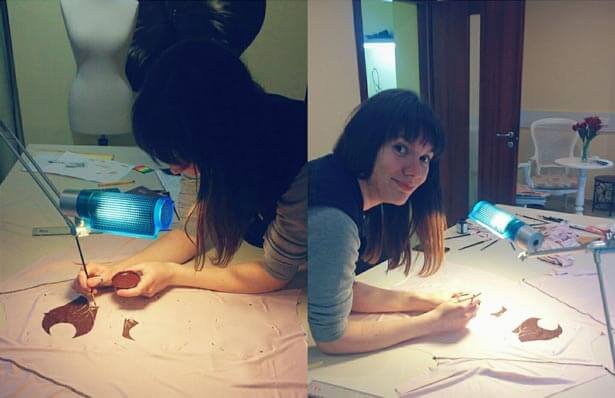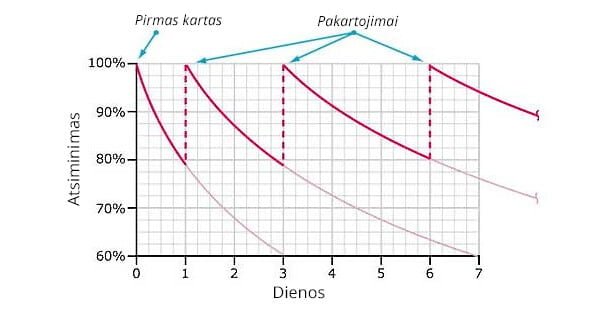When I was learning English, I envied the Americans, when I was learning Spanish, I was jealous of the Mexicans... Why is it so easy to speak the mother tongue, 1 and learning a new one is so hard!?
...What can we do to make learning new languages easier?
Today I am interviewing Hristina Kiprijanovska from Debesy, 18 years old, living in Panevėžys. She found herself in Lithuania 9 years ago after emigrating from Little Macedonia.
Hristina took on a seemingly insurmountable task for a young woman - learn the Lithuanian language. And today he shares his experience.
PLUS: 3 Science-Backed Tips
In the second part of this conversation you will find tips for learning new languages. So, if you are learning English, Spanish, Lithuanian or even Chinese - read to the end. Or click here and jump.
...But let's start with a short interview:

🌐 Hello, Christina. who are you
I am Hristina Kiprijanovska - a Macedonian living in Lithuania. I am also a high school student - I study at the Panevėžys city gymnasium. I like to make different kinds of desserts like chocolate cupcakes. Relatives say that I am creative and open. Sometimes I write on your Tumblr page, and even more thoughts swirl in my head.
I often challenge myself because I'm a crazy maximalist. I try to learn as much as possible, learn and keep up with everything. True, I would only write 6+ on the challenge scale, because I am not the "bravest lion" in all situations.
🌐 What challenge did you take on and what were the rules?
So, my challenge began when, at the age of ten, I had to leave my native Macedonia for a completely foreign country - Lithuania (although my grandparents are from Lithuania).
In one year, I had to learn a difficult language, understand the country's culture, and get used to the people. By the way, Lithuanians are more closed than Macedonians.
Circumstances forced me to accept this challenge: Macedonia's economic situation and parents' desire for a better life. For example, at that time Macedonia had a very high unemployment rate and most people worked illegally.
🌐 how did it go
It was not always easy, because, as I said, the Lithuanian language is not easy to learn. I studied at Panevėžys high school. At school, together with my sister, we usually stayed after classes to study Lithuanian.
Our teacher really helped a lot. Of course, we were supported by our parents and friends. The statement that children learn foreign languages easier and faster was confirmed - I was only 10 at the time.
At first there was wordsmithing. After that, I tried to read Lithuanian magazines, books, look for more words in the environment, speak Lithuanian more.
🌐 And what bothered you the most?
Sometimes, while I was still studying, I received various responses, questions about why I don't speak Lithuanian.
Once, while shopping in a store with my sister, we couldn't find the price of a product. Noticing a woman of mature age, we decided to ask her in Russian where we could find out the price of the product. We thought that the woman would answer, but we got a different reaction: she started using obscene words and told us to learn to speak Lithuanian.
I also had one teacher who said that she would not explain anything to me in Russian alone in the class. Well, school rules didn't require her to do that. However, I am glad that after a year I was transferred to another teacher.
🌐 How did you feel about the challenge?
I felt great. After learning the language better, I made even more friends. Support from loved ones also helped a lot. Now, until I tell people that I'm from Macedonia, they think I'm pure-blooded Lithuanian.
Sometimes it happens that the teacher says that I write better than my classmates, even though they have lived in Lithuania since birth.
🌐 Do you have any advice for people who want to repeat your adventure?
Let there always be a close person next to you. Trust yourself. Find a good teacher and don't give up when you get stuck. You should always remind yourself that even the most difficult changes bring many benefits.
Before leaving for a foreign country, I would suggest learning the language - at least the basic phrases, and intensive language courses upon arrival.
🌐 What challenge will you take on now?
I'm doing another challenge - I'm learning Italian on my own little by little every day. I would also like to pass the exams well and enroll in Scandinavian studies in Vilnius.

🌐 Thank you, Christina!
...But are you learning new languages too, listener?
Top 3 science-backed ideas for learning new languages.
If you have ever watched children, you must have noticed: they learn new things without even studying. For example, your first language. Or how to hide in closets and give parents panic attacks.
But how do you learn new languages without going back to your childhood?
First idea: Learn ideas, not language.
When I was still studying English and German at school, I was given a textbook and told to gnaw. Metaphorically. Word by word every day to blame the language, from the tiniest a to the tiniest z.
For some reason.
But this kind of learning - "I'd like to learn Spanish" - is tragically ineffective, because do you really need a whole dictionary to communicate?
...Do you really need such forging methods?
(Please don't study like this.)
Although most training programs are based on the formation of words and phrases, scientific research observing schoolchildren shows that language is acquired much better when it is used immediately. In the case of students, they learned French best by listening to lessons in that language.
What does this mean? After learning the basics of the language, continue not by learning everything in sequence, but, for example, listen to TED in that language. Or same.
Second idea: Study before you sleep.
If you've seen the animated movie Inside Out (2015), you should already know this. Our brains have a temporary mailbox, or in other words, the short-term memory, which quickly fills up with everyday information.
...Until we go to sleep or take a short nap.
Information received during sleep goes into long-term memory. Or at least such a short version, because the entire memorization mechanism is more complicated and depends on sleep quality, food or even thoughts.
What does this mean? Don't sacrifice sleep being lazy is healthy - get some sleep.
Third idea: Repeat.
Yes, I know, it's very boring. And I'd better not bore you with worn-out expressions that make me sick personally.
But language learning spread over time is proven best way to learn them. To-ro-dy-that, damn it. Stop looking for that book on how to become a European Parliament level translator in 15 minutes.
Here's what human memory curves look like: 2

As in 1885 German psychologist Hermann Ebbinghaus noticed - our memory is fading. However, when reminded of something, it not only returns, but also becomes stronger. It takes longer to forget.
(That's why it's sometimes difficult say "I did" and forget exes.)
If you study with a professional language teacher or a phone app like Duolingo help - you're in luck. For example, Duolingo is based on fun and engaging repetition.
What does this mean? When learning new ideas, remember to use old phrases. Or constantly repeat what you studied earlier two days ago. Without repetition, you will forget everything.
Additionally: Make the most of it.
Learning is not an exact science. Unlike repeating scientific experiments, here your experience may vary.
What does this mean? Study, study. For example, from these additional 7 learning exercises. Take advantage of them.
"One language opens the corridor of life for you. Two languages open all doors along the way."
- Frank Smith, linguist -
And so, step by step, you will learn to speak a new language. That's how Hristina from Debes learned Lithuanian!
...And what languages do you study? What else would you like to learn?
Share in the comments below. Let's do a little survey. After all, I believe that there are more than one among us who are learning new languages! And I'm curious. 😉
Hello, I am learning English through Russian with Duolingo. Question: maybe there is Duolingo for learning English through Lithuanian?
I'm trying Spanish - it doesn't work at all, I've never been friends with languages, I've had a lot of years - what advice would you give
I speak English and Spanish fluently, I can communicate in Russian, German and French. Lately I've been trying to learn Italian on Duolingo, but for some reason I don't find the app as interesting as others say. The most effective things for learning are watching movies or series in that language. For example, I wanted to improve my German knowledge, so I started watching Two and a half man in German. At first I understood about 20%, but after a few seasons it was already about 80%. I would say a good result. Anyway, I probably won't say anything new, but it's best to learn the language you're trying to learn. For example, this is how I learned Spanish in three months. Of course, I was in Spain then and there was a lot of language around. Of course, the fact that I didn't learn single words and my vocabulary was dotted with sentences of 6-8 words contributed a lot. In this way, I learned not just one word that I didn't know where and when to use, but the whole context. I studied French both with Lithuanian teachers and with foreigners. A faster result was studying with the French :))
I tried the Justlearn.com website, where I found a teacher who teaches me the Turkish language 🙂
I am slowly learning English and Russian.